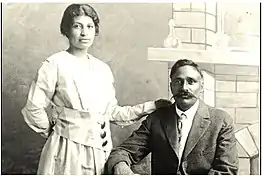Punjabi Mexican Americans
The Punjabi Mexican American community, the majority of which is localized to Yuba City, California is a distinctive cultural phenomenon holding its roots in a migration pattern that occurred almost a century ago. The first meeting of these cultures occurred in the Imperial Valley in 1907, near the largest irrigation system in the Western hemisphere.

| Part of a series on |
| Chicanos and Mexican Americans |
|---|
|
Punjabi immigration
For decades in the early 20th century, Punjabi farming families sent their sons out of Punjab to earn money.[1][2] Intending to return to the Punjab, only a handful of men brought their wives and families. In the United States, however, due to changed immigration laws it was not possible for the families of Punjabi workers to join them. Beyond this, poor wages and working conditions convinced the Punjabi workers to pool their resources, lease land and grow their own crops, thereby establishing themselves in the newly budding farming economy of northern California.[3]
Mexican immigration
Almost one million Mexican immigrants began entering America in the 1910s, shortly after the Mexican Revolution, with a large percentage arriving in families. A small number of these families picked cotton in fields farmed by Punjabi men. The Punjabi men are thought to have chosen women of Mexican ancestry for many reasons. Mexican women were accessible in southern California; in the central and northern areas of the state most Punjabi men remained bachelors..
Mexican women, much like the women of Punjab, covered their heads and bodies to protect themselves from the blazing sun while working in the fields.[3] Mexicans and Punjabis shared a rural way of life; with similar types of food and family values, and thus maintained a similar material and social culture. Mexicans and Punjabis shared an initially lower class status in American society.[1]
Intermarriage
Punjabi men married Mexican women laborers and there were eventually almost four hundred of these biethnic couples clustered in California’s agricultural valley.[1] Husbands and wives spoke to each other in rudimentary English or Spanish. The men tended to be older, in their late thirties or forties, and the women in their early twenties. Punjabi men learned Spanish to communicate with Mexican agricultural laborers and to speak to their wives. Some Punjabi men adopted Spanish names or nicknames: Miguel for Maghar, Andrés for Inder, Mondo for Mohammed.[1]
The fathers transmitted little of Punjabi culture to their wives and children, except for food and funeral practices. Cooking in the home drew from both Mexican and Punjabi cuisines and the men taught their wives to cook chicken curry, roti, and various vegetable curries. For example, the Rasul family in Yuba City runs the only Mexican restaurant in California that features chicken curry and roti.[4] Another important retention of Punjabi culture was the disposition of the body upon death. The Hindus and Sikhs insisted upon cremation, then uncommon in North America, and Muslims carried out orthodox burial ceremonies for each other (though the plots in which they are buried in rural California have since been misnamed "Hindu plots"). The wives were buried in the Mexican Catholic section of local cemeteries, as were the children.[1]
Notable people
- Mike Mohamed (b. 1988), American football linebacker
See also
Other merged inter-ethnic/racial groups in North America
- Cherokee Freedmen Controversy (African-American Cherokees)
- Chindians (of mixed Chinese and Indian ancestry)
- Hapa (of commonly Native Hawaiian/Asian American descent)
- Irish Quebecers (French speaking Canadians of Irish descent)
- Métis (Native-American/English or French descent)
- Mestizo Americans (Native-American/Spanish descent born in North America)
References
- Karen Leonard, PhD (May 1989). "The World & I". The Washington Times Corporation. Archived from the original on 2007-06-09. Retrieved 2007-06-06.
- Palhotra, Nishi. "The 'dirty Hindus'." Hardnews. March 2008. Retrieved on April 15, 2012.
- Jayasri Majumdar Hart. "Roots in the sand". PBS.
- (SAADA), South Asian American Digital Archive (2013-08-05). "A visit to Yuba City, California". South Asian American Digital Archive (SAADA). Retrieved 2017-12-31.
Further reading
- Leonard, Karen (1994). Making Ethnic Choices: California's Punjabi Mexican Americans. Temple University Press. p. 362. ISBN 9781566392020.
